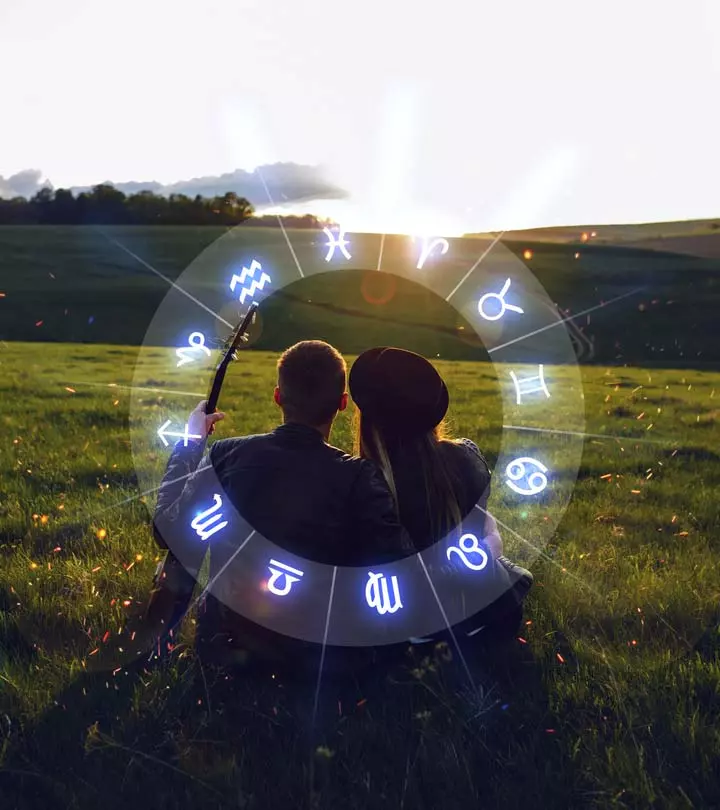11 Different Types Of Love In Relationships & Their Indicators
Explore the forms of love you can feel, be it naïve infatuation or absolute selflessness.

Image: Midjourney/ StyleCraze Design Team
Love is a complicated emotion, and who does not try to put this wonderful feeling into words in their sweet way. It holds different meanings and makes us all warm inside. However, love is classified into different types depending on how everyone receives it. These types help you understand what kind of bond you are sharing with others, the kind of love you are experiencing, and your compatibility with your partner, especially in romantic relationships. In this article, we have discussed types of love and their indicators. Scroll down to check out what they are.
In This Article
Types Of Love + Their Indicators
Scholars of various disciplines have tried to define what love is. Among them, Robert Sternberg, an American psychologist and psychometrician, is famous for his Triangular Theory of Love (1). The theory defines love through three components: intimacy, passion, and commitment. A study done on 213 married couples supports the triangular theory’s primary assumptions that intimacy, passion, and commitment are significantly connected to improved relational satisfaction (2).
Intimacy represents emotional closeness, passion involves physical attraction, and commitment is the decision to maintain the relationship. True, lasting love contains all three. Different combinations of these elements create various types of love, such as romantic, companionate, or consummate love. This theory helps explain how relationships evolve and why some bonds feel deeper than others. Here are some broad categories of love and signs that you are feeling it. These are backed by expert opinion and will help us understand the different kinds of love. Read on!
1. Infatuation

Infatuation is a short-term burst of intense attraction and passion towards a person. Ill-informed and imaginary projections about the other person and where your relationship will be down the line are usually the basis of infatuation. Infatuated feelings make you feel dreamy about a person and paint a perfect image of them. Good examples of infatuation are the early phases of a new relationship, erotic love or sexual connections (no-strings-attached relationships), and puppy love or crushes.
For example, two people lock eyes across a crowded cafe, and from that moment, the pull between them is undeniable. They exchange numbers, and within days, they are texting nonstop. They meet every chance they get and are swept up in the thrill of something new. Each showers the other with compliments, grand gestures, and dreamy plans for the future, even though they barely know each other’s middle names.
Red flags like differences in values, priorities, and communication styles are ignored in favor of the intoxicating rush. But as the weeks pass, the excitement fades, and reality sets in. Without the spark of infatuation fueling them, they realize there’s little substance beneath the fantasy, and just as quickly as it began, the connection dissolves.
Here are some signs that hint at infatuated love:
- Thoughts of that individual consume your mind.
- You tend to admire superficial traits and overlook all the possible red flags.
- When infatuated, you try to go beyond your comfort zone to please the other person.
- Infatuation is filled with obsessive feelings and controlling tendencies.
- The progression towards forming a connection and developing feelings about a person is fast and quick.
- Even if your interests and compatibility are in question, it doesn’t bother you much.
- You try to grow over the person.
2. Empty Love

Relationships with empty love are bound by commitment. Unlike passionate lovers, empty lovers don’t make emotional intimacy and passion a priority. Though passion and intimacy die, the commitment remains.
For example, say two people have been together for years. Their lives are intertwined in routines, shared responsibilities, and unspoken agreements. They wake up, exchange polite good mornings, and go about their day. Their conversations are limited to logistics like grocery lists, bills, and schedules. The warmth they once felt has faded and is replaced by a quiet understanding that they will stay together. It is not because of love or passion, but because leaving feels more complicated than staying. They rarely touch or laugh with each other, and when they do spend time together, it feels more like an obligation than a choice. Yet, despite the emptiness, neither makes a move to change things.
Empty relationships can either come at the end of a passionate relationship or may be a product of your hesitation to develop passion and intimacy in a blooming relationship. Empty love does have the ability to spring into passionate love if you open up to your partner and give it some time.
Some indicators of empty love are:
- Love indicators, such as passion and intimacy, which lead to satisfaction and better fulfillment, are absent in this type of love.
- Obligations and responsibilities sustain the bond.
- You don’t feel physical attraction towards your partner.
- Spending quality time with your partner seems like a task rather than something you enjoy.
- Meeting common interests and the same level of enthusiasm seems far-fetched.
- Communication is no more the key to your relationship; it is highly stunted.
3. Self-Love (Philautia)

Love is not always a two-way street; it is also about loving, appreciating, and accepting oneself. Self-love is a process.
For example, a person once sought validation in everything they did, but over time, they began to realize that true fulfillment could not come from others. They started setting boundaries, saying no to things that drained them, and prioritizing their well-being without guilt. Instead of criticizing themselves for mistakes, they learned to treat them as lessons. One evening, after a long day, they chose to rest instead of overworking to meet unrealistic expectations. In that small moment, they recognized the quiet strength of self-love.
Here are some striking traits you could develop if you practice self-love.
- You treat yourself with kindness, even when you make mistakes.
- Your self-worth is not dependent on external validation.
- You prioritize your mental and physical well-being.
Here are a few ways to kindle and benefit from self-love:
- Adopting Mindfulness: People who love themselves are aware and conscious about how they feel and think. Also, they can clearly define what they need and want.
- Self-Nourishment: Self-love pushes people towards a self-nurturing and independent lifestyle. You should maintain a healthy balance of proper diet, exercise, sleep, and social life.
- Setting Boundaries: People who truly and deeply understand self-love emphasize the importance of setting boundaries. It involves rejecting the idea of anything that causes any physical, emotional stress.
- Forgiveness: We are often harsh on ourselves for tiny mistakes and errors. However, engaging in such behavior only promotes self-loathing and self-deprecation. It is, thus, better to be kind to ourselves and treat every opportunity or failure as a stepping stone to success. In the end, we must all understand that our hearts need acts of forgiveness and love.
 Trivia
Trivia4. Selfless Love (Agape)

Selfless love is the art of giving and offering love without expecting anything in return. Feeling selfless at heart is the ultimate, purest, and highest form of love. People who radiate such kind of love hold virtues like kindness and compassion towards everyone. To be selfless is to speak the language of true love. A living example of selfless love would be our mothers.
To elaborate further, consider the following example: A person notices their partner struggling with their dreams, feeling discouraged by setbacks. Without hesitation, they offer unwavering support. They stay up late to help, celebrate even the smallest victories, and never expect anything in return. When conflicts arise, they choose understanding over resentment, always prioritizing the bond over their own pride. Even in moments of sacrifice, their happiness comes from seeing their partner thrive. To them, love is not about taking; it is about giving freely, without conditions.
Some striking traits of people who love selflessly are:
- You help your partner to achieve their goals and reach their true potential.
- You don’t hold grudges and resentment.
- Your expectations have a low benchmark.
- You prefer listening over making any unwanted assumptions.
- Compromises bring happiness rather than frustration to you.
- You put other people’s well-being above your own.
5. Romantic Love (Eros)

Strong feelings of love, intimacy, and passion drive romantic lovers. People who bond over romantic love are both physically and emotionally invested in each other. Surprisingly, even though the couple enjoys fierce passion and close intimacy, they lack commitment.
For example, two people meet and feel an instant spark. Their conversations flow, and their time together is filled with deep gazes and tender touches. Every moment apart feels too long, and they crave each other’s presence. Their dates are filled with long walks holding hands, whispered words, and stolen kisses under city lights. They explore each other’s minds and bodies, fully immersed in the excitement of the moment. Yet, when the rush fades and real-life challenges arise, they realize they never spoke about the future. Their connection was intense, but without a deeper foundation, it began to drift.
Romantic love flourishes during the initial phase of dating. Separation and detachment are easy in such bonds as there is no allegiance to the partner.
Here are some ways to detect that you have romantic feelings for someone:
- You use more skinship in the relationship.
- You can’t get enough of being with your partner.
- Kissing, cuddling, and getting intimate is what you do most of the time.
- There’s a strong affection for your partner.
6. Playful Love (Ludus)

As evident from the name, playful or Ludus love is all about flirting and having a good time with your partner. Usually, couples get playful by teasing each other, flirting openly, making the partner feel euphoric, and getting their heart to flutter. Playfulness is a love language that helps the relationship to bud and blossom into something fruitful.
Take this for example: two coworkers often find themselves exchanging playful remarks in the breakroom. A raised eyebrow, a smirk, a well-timed joke. Every interaction feels like a game. They challenge each other to harmless bets, like who can make the best cup of coffee or finish a report first. Neither of them takes it too seriously, but there’s an undeniable spark in their lighthearted teasing. Their connection is built on laughter, stolen glances, and an unspoken understanding that this playful relationship is what makes their days a little more exciting.
A few ways to know you are high on the playfulness meter:
- Dates are a frequent occurrence.
- You indulge in touching and flirting.
- Spending quality and a good time are high on your agenda.
7. Affectionate Love (Philia)

Affectionate or platonic love exists among friends and family members. This form of love is not linked to any sexual connection. Loyalty and respect drive such relationships.
Say, two childhood friends have always been there for each other through every milestone and setback. When one loses a job, the other offers a listening ear, brainstorming ideas over late-night calls. When one falls sick, the other shows up with soup and a comforting presence. There is no expectation of anything in return, just the quiet assurance that no matter what happens, they will always have each other’s backs. Their bond is not about grand gestures, it is about trust, loyalty, and the kind of love that does not need to be spoken to be understood.
Here’s how platonic manner manifests in relationships:
- You support your friends and family members when they are in crisis.
- You engage in open dialogue and communication.
- Trust and faith are fragile. So, you try not to betray someone’s belief in you and break their trust.
- Being truthful is appreciated.
8. Familial Love (Storge)

Storge is a love connection seen in bonds like parents, children, and best friends. Though it has a close resemblance to philia, this type of love runs in close-knit families and deepest friendships. Unconditional love, deeper connections, and acceptance form the foundation of such relationships. Brotherly love, sisterly love, maternal love, and paternal love are all types of familial love.
For example, say a mother wakes up before dawn to prepare breakfast for her children, even though they are old enough to do it themselves. She packs their lunches with little notes of encouragement, just as she did when they were younger. When one of them makes a mistake, she scolds them but follows it with reassurances. Years later, when she grows older and needs help, her children return that love, caring for her with the same quiet devotion. No matter how much time passes, their bond remains unshaken.
Here’s how you can gauge the presence of familial love:
- Forgiveness comes easy to you.
- You are full of gratitude and gratefulness towards the other person.
- There’s a commitment to build a healthy relationship.
- You keep strengthening the bond by creating memorable and impactful moments.
 Quick Tip
Quick Tip9. Long-Lasting Love (Pragma)

A love that reaches the stage of pragma has witnessed years of companionship, bonding, and experiences that promote a healthy and positive bond between the couple. Say, after decades together, a couple sits on their porch, sipping tea as the sun sets. Their hands, wrinkled with time, still find each other effortlessly. They have weathered hardships, but they chose to stay, to fight for what they built. Their love is not always thrilling, but it is steady. It is like the rhythm of their morning walks and the unspoken understanding in their glances. They do not need grand gestures, their love is in the little things: the way he remembers her favorite tea or the way she hums his favorite song. It is a love that has lasted, not because it was easy, but because they never stopped choosing each other.
This age-old love It is backed by affection, commitment, and continuous efforts toward the relationship. A partnership built on such a dynamic brings out feelings of contentment, love, support, acceptance, and care. Such companionate love brings healthier attachment, understanding, and relationship satisfaction.
Here are some ways to know that you have built a relationship on long-lasting love:
- Effort plays an important role. You make a conscious effort to strengthen your bond and show your partner that they are loved and valued.
- Any adversities or hurdles in the relationship are worked out together.
- There’s a commitment to building a healthy relationship.
10. Obsessive Love (Mania)

Obsessive love or mania is loving someone while overlooking boundaries. In simple words, it is to love someone so much that it reaches a point of saturation. Typically, obsession-linked relationships are characterized by constant reassurances of love, looking for a safety net from the partner, unhealthy attachment patterns, and possessiveness. It results in sowing the seeds of co-dependency and an unhealthy one-sided relationship.
Take this for example: a person waits anxiously for a reply, staring at their phone, refreshing the chat over and over. Minutes feel like hours. When their partner finally responds, relief washes over them until the next delay. They check their partner’s social media obsessively, analyzing every like and every post. If they see them online but do not get a message, panic sets in. Doubt creeps in, fueling desperate attempts to hold tighter. What started as passion has turned into an exhausting cycle of fear and control.
The following are some ways to tell if obsession is a factor in your relationship:
- There’s a need to track and monitor every movement and action of the partner.
- You love the idea of controlling how they feel, think, and act.
- There’s a lack of emotional maturity.
- Unlike other relationships, obsessive relationships can’t strike the give-and-take balance.
- You feel threatened when your partner is out of your radar or space.
11. Companionate Love

Companionate love refers to calm love shared between two people. The form of love is usually durable, is gradual to develop into fuller terms, and involves mutual dependence.
Say, two people sit on the couch, not saying much, yet completely at ease. One flips through a book while the other scrolls through their phone. There is no urgency to fill the silence, just a quiet comfort in being together. They have seen each other through triumphs and hardships, through laughter and tears. Passion once burned brightly, but now it has settled into something deeper, a steady warmth that does not flicker with uncertainty. When one sighs, the other instinctively reaches out, a simple touch speaking volumes. Love is not a rush, it is a quiet certainty, a presence that never wavers.
The shared feelings of love, intimacy, and commitment include minimal passion that can sustain long-term bonds. Since it requires time to shape fully, this type of love can be felt between extremely close friends or couples who have been with each other for a long time.
Here are some indications that direct at companionate love:
- You feel like yourself in their company.
- The slow development of love makes the two more close and transparent with each other.
- You deeply care about one another and love spending time together.
- You are committed to your other half and are there for each other at all times.
Love works in combinations. Different types of love can come together to build exciting experiences that leave a lasting impression. In many connections and interactions, you can feel different kinds of love at the same time. While love doesn’t follow a rule book, understanding such combinations can help you strengthen your relations and improve your love language.
Key Takeaways
- Passion, intimacy, and commitment will define the kind of love you feel.
- Self-love makes you emotionally independent and healthy.
- Remember, one-sided relationships are unhealthy and become toxic eventually.
Types Of Love That Form Different Relationships

- Platonic/Friendly Relationships: The combination love code for friendship is affectionate love, self-love, and familial love.
- Romantic Relationships: The combination love code for a romantic relationship is enduring love, playful love, and romantic love.
- Familial Relationships: The combination love code for a family is familial love, selfless love, and affectionate love.
Infographic: 11 Different Types Of Love Explained
Love has many forms, and each has unique characteristics. No two people experience or feel the same kind of love when in a relationship. Moreover, the idea of love is not restricted to romantic partners but also extends to your family, friends, and other relationships you may have. Therefore, it’s important to know the form of love you are experiencing to nurture your relationship and make it much more fulfilling. Take a look at the infographic below to get an idea about the diverse forms of love.
Illustration: StyleCraze Design Team
Love is a wonderful feeling that makes us feel warm inside and holds different meanings for everyone. The interaction between passion, love, and intimacy determines the type of love you share with someone. We all experience the different types of love in our lives, be it infatuation, romantic, or playful love. However, understanding the difference between love and being in love is crucial. While you may feel deep love for family and friends, being in love typically involves a unique blend of passion and commitment that sets it apart. Love does not follow any rules and understanding the different types of love can help understand and strengthen the relationships you share with the people in your life.
Frequently Asked Questions
How does love influence mental health?
Numerous studies show that loving relationships greatly improve mental well-being by alleviating loneliness and depression while fostering a sense of belonging and emotional support. On the other hand, unhealthy relationships can increase stress and anxiety, negatively affecting mental health.
What are Sternberg’s 7 types of love?
According to Robert Sternberg, the 7 types of love are friendship, infatuation, empty love, romantic love, compassionate love, fatuous love, and consummate love. These are based on three components of love – intimacy, passion, and commitment.
What are the levels of love?
The most common levels of love are liking a person, attraction, intimacy, and increasing commitment.
What is the 3 true love theory?
As per one study, a person can fall in love thrice in their lifetime. Each one serves a different purpose. We learn, evolve, and get hurt, until we land on our third love, which as per this theory is “the one”.
What is epic love?
It is a deep and intense love that can overcome great obstacles in its path.
What is the lowest form of love?
That would be infatuation, which is based on superficial attraction without understanding and does not last long.
Do you know about different types of love? Take a look at this video to explore the 7 types of love and how many you have experienced.
References
Articles on StyleCraze are backed by verified information from peer-reviewed and academic research papers, reputed organizations, research institutions, and medical associations to ensure accuracy and relevance. Read our editorial policy to learn more.
Articles on StyleCraze are backed by verified information from peer-reviewed and academic research papers, reputed organizations, research institutions, and medical associations to ensure accuracy and relevance. Read our editorial policy to learn more.
- Towards a Comprehensive Theory of Love: The Quadruple Theory
https://pmc.ncbi.nlm.nih.gov/articles/PMC7248243/ - Intimacy, passion, and commitment among married individuals: further testing of the triangular theory of love
https://pubmed.ncbi.nlm.nih.gov/11191410/
Read full bio of Joy Nwokoro
Read full bio of Sneha Tete
Read full bio of Subhrojyoti Mukherjee
Read full bio of Reshma Latif



























Community Experiences
Join the conversation and become a part of our empowering community! Share your stories, experiences, and insights to connect with other beauty, lifestyle, and health enthusiasts.